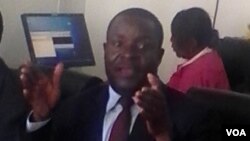Information Media and Broadcasting Services permanent secretary, George Charamba, says the American government is delaying Zimbabwe’s digitalization project by allegedly blocking payments to some of its suppliers
Briefing parliament’s information portfolio committee on the country’s progress on digital migration, Charamba said Zimbabwe had two payments frozen in Germany as a result of the United States’ sanctions law.
“Each time we do payments to Huawei we have questions to answer either directly from the American government or from European governments who are afraid of the American government. They want to know where this money is going, who the recipient is, what it is in payment of and sometimes even after you have given them sufficient answers for the first payment they still ask the same routine questions in a very boring way and in so doing it’s not just about the tedium of proving them with the same answer it’s a delay which follows as a result.”
He said the sanctions were delaying the whole process and Zimbabwe has to explain each time they make a payment to their major contractor in the digitization project, Huawei of China.
“It not that ultimately the Americans and Europeans will finally allow the money to go, it is the irritation of having to justify a transaction which is above board which is happening in a country where there is representations of both continents and therefore who know that we are engaging in broadcast project. You get a sense of being spied, you get a sense of gratuitous show of power, you get a sense of being constantly reminded that you survive on our good will. It irritates.”
He said Zimbabwe had engaged the Chinese over the matter and a new facility is set to be opened in China to reduce the hassles of paying through European banks.
A United States Public Affairs official in Harare referred all questions about this issue back Charamba.
Charamba said they had just covered 34 percent of the digital migration, adding that Zimbabwe had upgraded its systems in boarder areas and its telecommunications network no longer interfered with neighbours’ systems as required by international law.
Charamba said the country’s media laws were archaic and needed to be revamped to meet modern day trends and to harmonise with the constitution.
He said government would hold convene an indaba of stakeholders to look at the Information and Media Panel of Inquiry and the recent Constitutional Court judgement on criminal defamation before revamping media laws.
Media Institute of Southern African – Zimbabwe Advocacy officer Tabani Moyo said it was pleasing that government finally realized that the media laws were embarrassing.
“He also outlined that the laws governing the media industry are archaic. The Broadcasting Services Act and AIPPA they need to be done away with.”
Meanwhile, Charamba said government would engage media owners in the country as it seeks to improve ethics in the media industry.
“We will raise issues of ethics and professionalism, to say is it quite the remit of a publisher to have an editor who conveys hatred, a publisher who becomes an actor on a matter he is supposed to report on.”
Scores of journalists have been arrested or under the country’s repressive media laws such the Access to Information and Protection of Private Act and the Public Order and Security Act and others.




